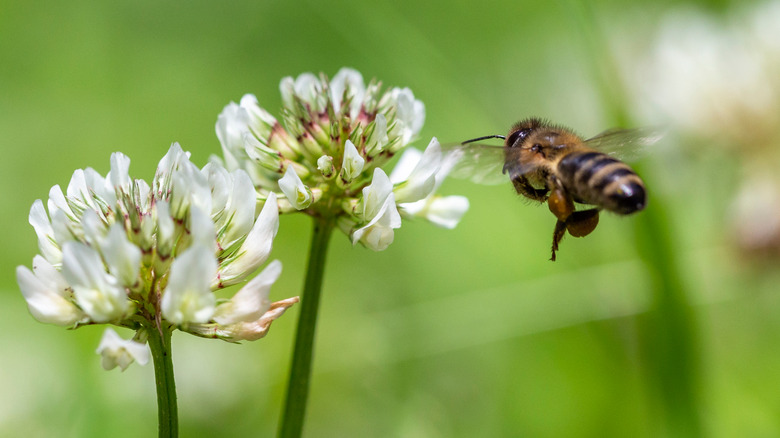Here's Why You Should Be Overseeding With Clover This Fall
Sometimes, reading about how a "good weed" should be welcomed on your lawn, it feels like we're on the verge of concluding that grass was the real weed all along. But even if you're not quite ready to take the plunge on meadowscaping for that natural look in your lawn or garden, you can still have the best of both worlds in the form of clover. The humblest and least intrusive of landscape "weeds" brings a lot to the table as a companion to your turfgrass, especially in bare spots caused by shade, pets, and unrelenting foot traffic.
"Overseeding" clover (adding it to an established turfgrass lawn, often in conjunction with additional grass seed) works best in the fall if your area is warm enough. The clover will germinate if your soil is above 50 degrees, and if you can get it established by spring, it will do a better job of keeping weeds in check all year. It will need about six weeks to take hold before the first frost. In areas with colder winters, it's usually safe to seed clover about two weeks after the last average frost date. But whenever you plant it, you'll be glad you did.
Why you should be thankful for clover
You'll see benefits from many quarters after you've overseeded with clover. Pollinators will thank you, or at least they should, because the blankets of little white flowers that take hold in early spring are a boon to the bees and beneficial wasps that will feed there and make the world a better place. Your children will thank you (okay, they won't, but they also should) because fewer places are more pleasant to walk barefoot than a lawn of dense clover. And you won't mind because it does not need the bonanza of suspect lawn chemicals that many grass lawns demand.
Your grass will thank you because it will become healthier through this process. Clover makes it possible to fertilize your lawn less because it fixes nitrogen in the soil. This might cause you to worry about weeds storming in and out-competing your grass, but clover is also a fantastic weed suppressor that will coexist perfectly happily with a healthy grass lawn. And the lessened need for herbicides, fertilizer, and even watering means your pocketbook will thank you. Even your neighbors will thank you because those bald spots on your lawn will be gone. And since clover tolerates mowing without a hitch, you can effortlessly keep your yard looking tidy.

